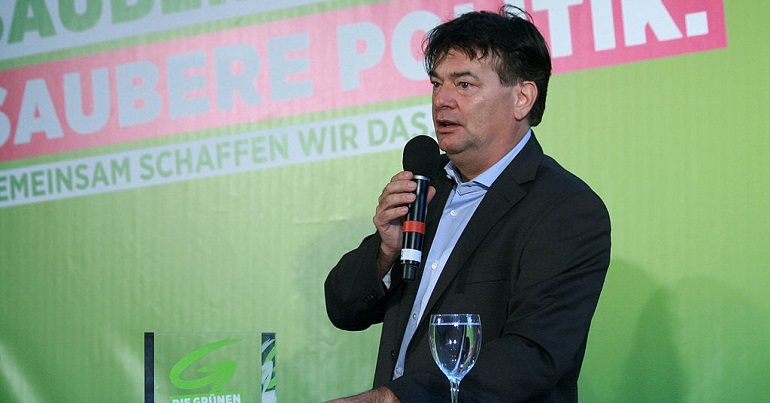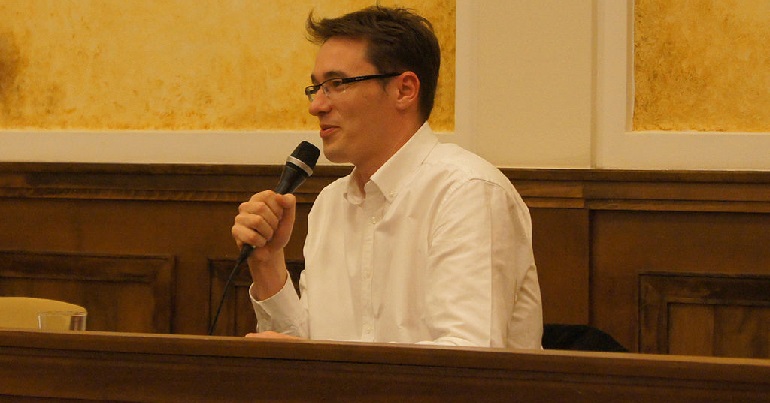Central Europe’s Green leap forward – Global Green column #3
The last decade or so has seen Central Europe make clear moves towards authoritarianism. Far-right national populist governments has mostly ruled, combining xenophobic rhetoric with increasing Euro-scepticism and the rollback of democracy. Women’s rights have suffered – and the treatment of the LGBT community in the former Eastern bloc countries lags behind western Europe.
But there are moments of hope amidst the despair – this past month has revealed a public cry for a different kind of politics as the region experienced a surge in support for Green and progressive voices.
Austrian Greens benefit from snap election

Austria’s general election on September 29 was not meant to happen this year. Austria veered to the far-right in 2017 as the refugee crisis was weaponised by the far-right Freedom Party. A right-wing coalition into power – with Conservative People’s Party chancellor Sebastian Kurz presiding over a coalition with the far-right Freedom Party. In 2017, the Austrian Greens – one of Europe’s oldest and well-established Green Parties – suffered their poorest results since 1983 losing all their seats, partly due to internal strife. Austria’s president Alexander van der Bellen is the former Green Party spokesperson – the first Green President in Europe to be elected by a popular vote – though is now labelled as ‘independent’.
The 2019 snap election was called due to a corruption scandal in May 2019. The ‘Ibiza Affair’ involved two key members if the ruling coalition (Freedom Party leader and Austrian Vice chancellor and the Freedom Party’s deputy leader) being caught on tape promising government contracts to a woman they believed to be the niece of a Russian oligarch, in exchange for campaign support.
This snap general election was bad news for the Freedom Party whose support dropped by about a third. On the other hand, the Greens were back with a bang with their best ever result – 13.9% of the vote, and winning 26 seats. Once again in Austria, the Greens are a force to be reckoned with. The next government is as yet undecided – Kurz’s Conservative People’s Party may choose to form another alliance with the Freedom Party or attempt to charm the Greens.
Breakthrough in Poland
October 13 saw Poles go to the voting booths to elect both upper and lower houses of their parliament. The Polish Green Party, Partia Zieloni, gained their first ever representation in the national assembly, with three seats in the lower house, the Sejm. This was through a new electoral alliance founded in 2018 known as Civic Platform, which brought together pro-European parties and independent leaders and branded itself as a social movement more than a political alliance.
The ruling party is still, however, the incumbent far-right Law and Justice Party (PiS) who received the highest vote share by any party since Poland’s return to democracy in 1989 – a significant victory. They lost their majority in the upper house, the Senate, to the opposition. The extreme right entered parliament for the first time.
This is a far-right government which has attempted to integrate a regressive Catholicism as part of its politics. It has presided over a rollback of LGBT and women’s rights, as well as the erosion of the rule of law (forcing the EU to step in). Ecologically, the government has blocked progress at the European level and regressed within its own borders, embarking upon deforestation in a World Heritage Site. Europe’s oldest primeval forest and home to its only bison Białowieża forest was threatened with logging despite public outcry and its protected status as a World Heritage Site. The government was ordered by the European Court of Justice to end its logging, but only relented when faced with a €100,000 (about £87,000) fine for each day it violated the European Court of Justice directive.
These new Green MPs represent a breakthrough for a country where environmentalism remains a fringe concern, and where the Greens failed to gain seats in the European elections. This success reflects a recent awakening of environmentalism in a country with deep historical and cultural ties to coal – and which indulges what Polish Green politician Miłka Stępień has called the ‘mythologisation’ of coal. In the past couple of years, the steadily growing Partia Zieloni has started to shift the debate, fuelled by growing awareness of air pollution (Poland contains 36 of the 50 European cities with the worst air quality) and more recently by hosting COP24 last year.
For now, far-right nationalism still reigns over Polish politics but with a comeback from the Social Democrats and three new radical, green and progressive politicians in the Sejm, this marks a shift in the fight to protect Poland’s nature and democracy.
If you’d like to know more, Bartek Kozek’s ‘Poland Discovers Ecology’ is a good place to start.
The Greening of Budapest

The winds of change must have blown south that same day – as Hungary’s capital city veered into a new political direction. Joint opposition candidate and Green Gergely Karácsony took the mayorship from incumbent Mayor István Tarlós with over 50 percent of the vote. Tarlós is backed by Fidesz, the party of Hungary’s ruling far-right party.
This was the first time since 2010 that the democratic forces were united, with startling results. The opposition, which includes Greens and other progressive forces, also gained a majority in the city council, and won 10 out of the 23 most populous cities of Hungary, an increase of eight since the previous election.
Interestingly, Gergely Karácsony’s campaign learned lessons from the recent Mayoral race in Istanbul where centre-Left candidate Ekrem Imamoğlu became Istanbul mayor in June 2019, ending 25 years of government party rule in the city after a fiercely contested re-run election. According to Krisztian Simon, Karácsony was decided to incorporate the Istanbul campaign’s policy of ‘radical love’ and of keeping the opposition “united despite its differences and forge a strong message without demonising the opponent’s electorate”.
Budapest’s mayor and council are now in opposition to Hungary’s ruling populist and nationalist party Fidesz and its Prime Minister Viktor Orbán. In his nine years as Prime Minister, Orbán has been increasingly open about his project to turn Hungary into an ‘illiberal democracy’.
His crackdown on independent civil society has attacked NGOs, academia, and cultural institutions. The latest victim has been the Central European University (CEU) – a paragon of world-class learning set up by US-Hungarian philanthropist George Soros in 1991. When Hungary finally forced it out in late 2018 it joined Russia, Turkey and Belarus in shutting down independent universities. The University has long been a point of contention for the Hungarian far-right, but the fact that Orban has managed to push it out is testament to his growing strength and what Cas Mudde calls ‘the Trump era’.
The slow rollback of democracy in Hungary has been self-reinforcing, as a crack down on free media stifles opposition and the erosion of the rule of law tightens Orbán and his party Fidesz’s grip on power. Former Dutch Green MEP Judith Sargentini documented the state of Hungary’s democracy in a report for the European Parliament, catalysing its first ever triggering of article 7, created for when a member state breaches the rule of law. The report enumerated a number of concerns concerning the rule of law in Hungary, its electoral system, the independence of the judiciary, corruption, freedom of expression, assembly and religion, as well as the rights of minorities and asylum-seekers and issues connected with equal opportunity.
Key to Orbán’s push towards authoritarianism has been the vilification of minorities – seen most visibly in his attacks on refugees and his antisemitic rhetoric about George Soros – and his euroscepticism, which allows him to take the EU’s money whilst portraying it as bureaucratic and authoritarian liberal elites plotting against Hungary’s interests. Sound familiar?
That a new mayor, standing strongly against Orban’s view of the world, defeated his Fidesz-backed incumbent, is no small victory. A different, green politics is taking hold in Hungary and progressive forces in Europe must support it.
Karácsony has not wasted any time – the municipality of Budapest declared a climate emergency (unanimously) on the 5th November, the first city in Central and Eastern Europe to do so.
Whilst the national government continues down its climate-sceptic, far-right and anti-democratic route, a different, green politics is taking hold in Hungary and progressive forces in Europe must support it.
Conclusion
In this past month Central Europeans have chosen a different, fresh vision to rival the dominant strongman politics. This will spring hope after the European elections suggested a Europe once again divided between an increasingly illiberal east and liberal West.
These results also continue a trend of rising support for the extremes – the Greens on the one hand, and populist far-right on the other. Considering that Central Europe has been blocking environmental legislation in the European Parliament – blocking attempts EU moves towards an already weak 2050 zero carbon goal – news of a rise of Green parties is good news on many fronts and will be key to the future shape of Europe.
Despite disappointing results for central European Greens in the May 2019 European elections, these results prove that a Green and democratic message strikes a chord in the region and that a rollback of rights and democracy is by no means inevitable. The results also attest to a successful rise in cross-party collaboration – the reason for success in both Hungary and Poland – which bodes well for the future and must inspire progressive forces across the world. For a part of the world which has suffered from the neoliberal reforms of the 1990s and 2000s and has its own historical aversion to socialism, perhaps the fresh, progressive approach of the Greens is what is needed.
Coming up in the next column – a breakdown of Canada and Switzerland’s recent elections…
This article was amended on November 10 to clarify a claim that Gergely Karácsony’s campaign modelled itself Ekrem Imamoğlu’s campaign in Istanbul.




Hello there! I’m pleased to see that you are starting to include news from Central Europe in the blog. The win by Gergely Karácsony is indeed very good news for us here in Budapest. However, I wish you would check with me before writing about Hungary. There are a few points that are either errors in your article or miss some important green points. 1. Budapest’s mayoral campaign was not modeled on Istanbul’s, it was only outside observers who drew the parallels. 2. Karácsony ran for a coalition yet is actually a member of Dialogue for Hungary, the only truly Green Party in Hungary, and so the Greens were punching above their weight as the party is minuscule. 3. He ran on a promise of declaring a climate emergency and with the support of countless green NGOs. On November 5, the municipality of Budapest declared the climate emergency (unanimously), the first city in Central and Eastern Europe to do so.
Thanks for the useful comments Violeta!
Regarding your point about Istanbul’s Mayoral elections, you’ll have to take this up with Krisztian Simon as his below piece is where I got this information 🙂
https://www.greeneuropeanjournal.eu/the-hungarian-oppositions-cautious-battle-for-budapest/